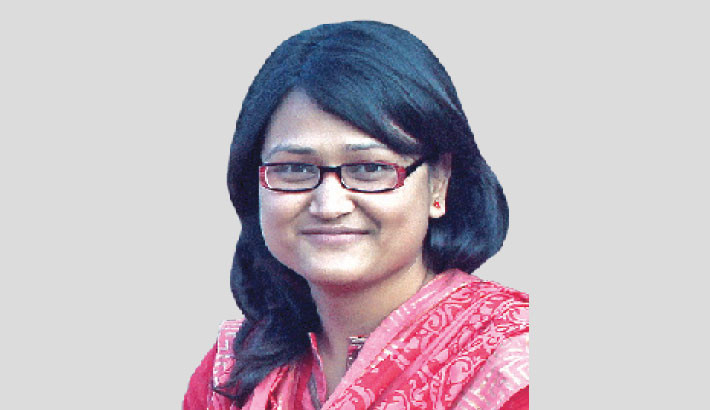
Kaniz Kakon
In a world too often indifferent to the cries of the oppressed, the United Nations General Assembly has taken a courageous step, invoking the International Court of Justice (ICJ) to examine Israel’s legal obligations in the Occupied Palestinian Territory (OPT). This move, enshrined in Resolution A/RES/79/232, is more than a procedural act. It is a flicker of hope in the long night of Palestinians’ sufferings. For a people whose existence is defined by resilience, this request to the ICJ feels like a fragile lifeline—a chance, however slim, for justice to shatter the silence of indifference. The OPT is not just a geopolitical issue. It is a living narrative of a people striving for dignity amid relentless adversity. For decades, the Palestinians’ voices have echoed against barriers, seeking recognition not only of their land but of their humanity. Often perceived as distant and abstract, international law becomes a tangible promise and a potential remedy for the generational wounds inflicted by occupation.
The ICJ’s involvement is like a lighthouse piercing through a stormy sea of global politics, where power frequently drowns out justice. In 2004, the Court’s condemnation of Israel’s separation barrier offered a rare moment of clarity, calling out violations of international law. Two decades later, the stakes have intensified. The OPT has become a place where survival itself is an act of defiance, and the humanitarian crisis grows more dire with each passing day. This latest advisory opinion has the potential to be more than a judgment—it could serve as a global clarion call, urging the world to acknowledge and act upon the plight of Palestinians. Yet, the road to justice is fraught with obstacles. Israel’s consistent rejection of international judicial oversight underscores its entrenched skepticism of global mechanisms. To Palestinians, this resistance often feels like another layer of the occupation itself—a denial not just of their land but of their right to seek redress. How can one appeal to justice when the systems meant to uphold it are so readily dismissed? The ICJ’s opinion, while not enforceable, might still serve as a moral reckoning, a testament that the oppressed cannot be indefinitely silenced, no matter how tall the walls are or how audacious the opposition is.
Indeed, this moment demands legal acumen as well as a deep moral resolve. Palestinians’ is not just a tale of conflict. Rather it is a chronicle of human endurance—of families clinging to hope and of culture devastated by displacement. The ICJ’s opinion is more than a judicial document; it is a rare chance for the international community to align itself with the arc of justice. From the invisible strength of a farmer tending his fields to the passionate resolve of activists demanding change— the spirit of Palestine endures, firmly refusing to be extinguished. The human cost of this struggle is staggering and often overlooked in the sterile language of resolutions and opinions. In refugee camps, generations have grown up without ever seeing their ancestral homes, clinging to stories passed down as heirlooms of identity. The persistent blockade on Gaza has turned it into an open-air prison, where basic necessities become luxuries and hope feels like a contraband item. The ICJ’s opinion carries the weight of these realities, acting as a potential counterweight to the inertia of indifference that has long defined international response.
At its heart, this deliberation is a battle of narratives. Israel’s dismissal of international judicial interventions is not merely political; it’s a strategy to control the story. By rejecting oversight, it seeks to frame the occupation as a security necessity rather than a human rights catastrophe. For Palestinians, the ICJ’s opinion represents a chance to reclaim their narrative, to tell their story not as passive victims but as active claimants of their rightful place in the world. It is a fight not just for land but for the soul of a people who refuse to let their identity be buried under occupation. As the ICJ deliberates, the weight of history looms large. The court’s pervious advisory opinions—from the condemnation of apartheid in South Africa to the validation of decolonisation movements—have shown that the arc of justice can bend, however slowly, toward the oppressed. Each word in the upcoming opinion will be scrutinised, each principle invoked a potential tool for advocacy. This is not just a question of legal interpretation but of moral leadership, challenging the international community to look beyond immediate interests and embrace a broader vision of justice.
For Palestinians, this moment is a flicker of light in a long and often dark tunnel. Whether the ICJ’s opinion will lead to tangible change or remain another unmet promise depends on what the world does next. Will nations rally around its findings, or will they let them gather dust in the archives of unrealised potential? For now, the people of Palestine wait, their lives suspended in the delicate balance between despair and resilience. In their endurance lies a powerful message: justice delayed must not become justice denied.
The writer is an assistant professor in the Department of Philosophy at IUBAT and pursuing a Masters in Human Rights and Multiculturalism at University of South Eastern Norway

